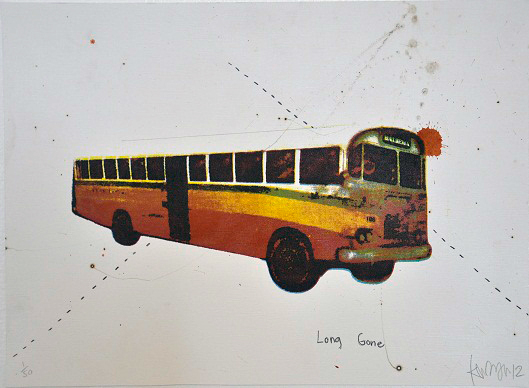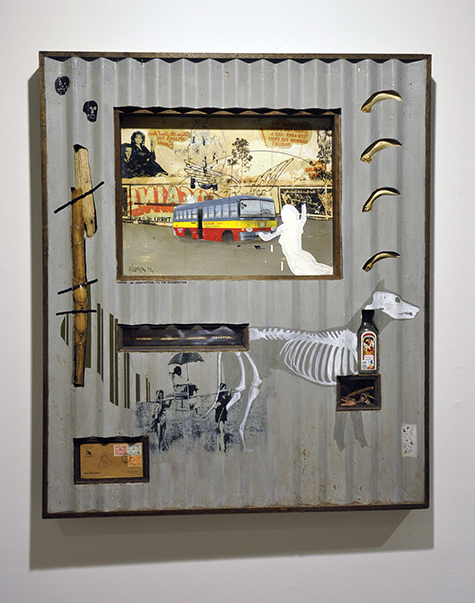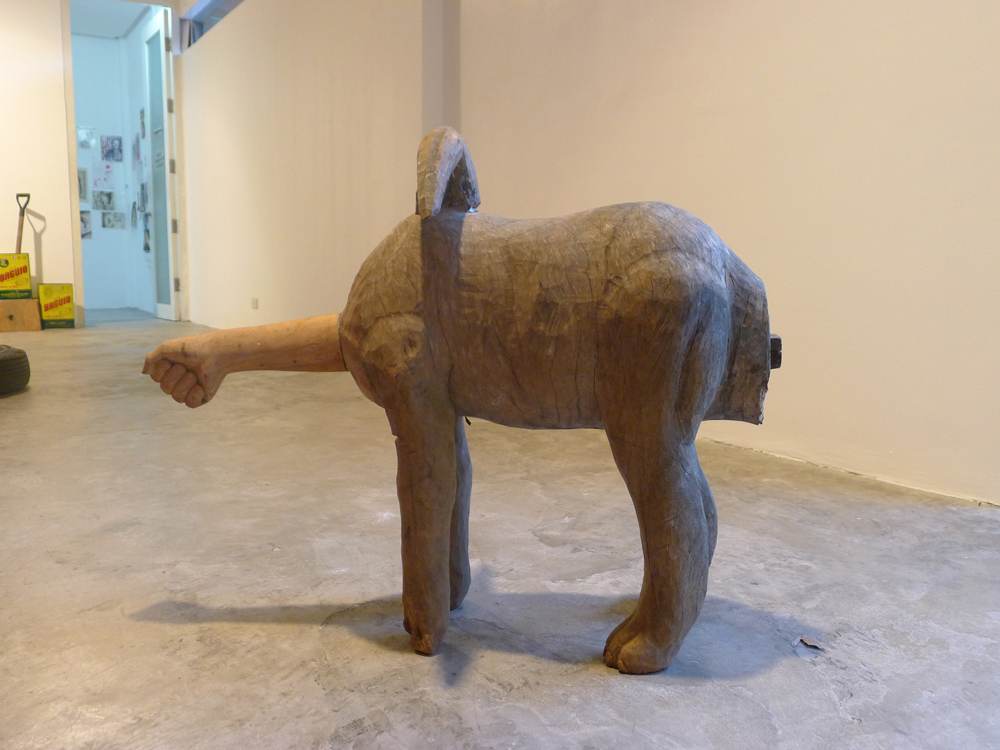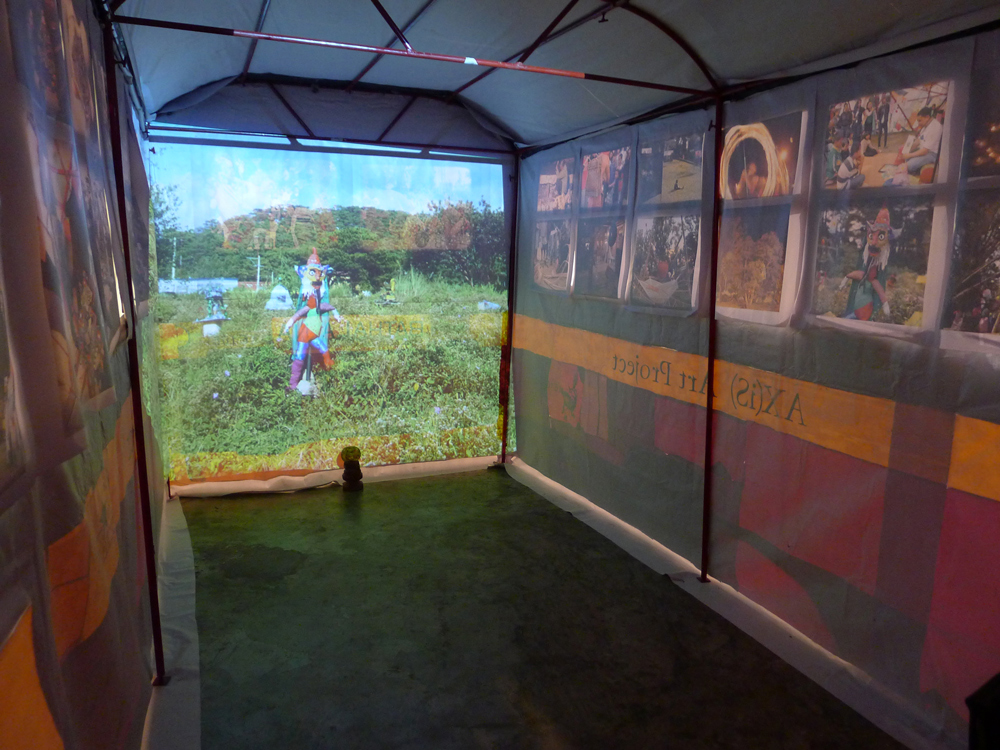Halsema AX(i)S Art Project
Kawayan de Guia, AX(i)S
20 October – 18 November 2012
Curated by
20 October – 18 November 2012

Anyone who has traveled from Baguio to Sagada would be familiar with the old Dangwa Bus. Up to about a few years ago, the rickety non-airconditioned buses, some with wooden high-backed seats, regularly plied the Halsema Highway. Often crammed with passengers and cargo, it departs from the equally old-style Dangwa terminal in downtown Baguio early in the morning and arrives in Sagada around seven hours after, depending on weather and road conditions.
These days, it is easier to get to the Cordilleras as the mountain paths have become wider and more accessible, making way for an influx in tourism and trade. Now, it is quite common to see trucks, vans, SUVs, and luxury buses along the mountain trail, replacing the old Dangwa buses. Some of which have been transformed into alternative shelters, storage rooms, pit stops, and sheds, if not totally left abandoned like stripped carcasses along the highway. Yet despite these modern conveniences, traveling up north retains its share of danger, beauty, and unpredictability. While it is a place one seeks in order to find and lose oneself, it is also a place that is shaped by the interaction of all elemental forces.
In Kawayan de Guia’s latest installation, the old Dangwa bus is re-purposed as the vehicle for AX(i)S, a collective that he initiated with other young artists in Baguio last February 2011 as part of the larger Panagbenga Flower Festival. In the same spirit as the early Baguio art festivals in the 1990s, it is a convergence of artists from different fields who seek to reactivate art in the public sphere. The week-long festival featured installations, performances, screenings, and other activities around Burnham Park, with a dome-shaped tent patched from ukay-ukay clothes serving as its main hub.
For the exhibition at MO_Space, documentation of the works and happenings at last year’s AX(i)S festival will be projected inside a bus made from the re-sewn ukay-ukay tent. Scattered around the floor are smaller assemblages of found objects like roadside shrines or landmarks that provide us with a sense of place or direction. The exhibition is a prelude to another AX(i)S project this coming November, wherein artists will be creating various works along the stretch of Halsema Highway. Supported by the Cordillera Green Network, the project addresses diverse issues ranging from nature, nomadism, travel, connectivity, collaboration, and environmental change.
As one of the drivers of AX(i)S, Kawayan takes us through detours and alternate routes to a more expansive yet deeply-rooted way of art-making and culture-bearing. In this exhibition, the bus, tent, used clothes, and other salvaged objects are not only used as contemporary emblems of the Northern way of life; they also represent the resiliency of independent artists’ communities despite the current impasses in the local art scene.
About the Artist
About the Artists

Kawayan de Guia (b. 1979), son of the well-known local filmmaker and National Artist for Cinema Kidlat Tahimik (Eric de Guia) and German stained-glass artist Katrin de Guia, is a painter, installation and performance artist based in Baguio City, Philippines. He finished his bachelor’s degree in Fine Arts at the University of the Philippines (UP). In 2011, de Guia initiated AX(iS) Art Projects—a biennial gathering of artists from different fields working on the idea of transience, site-specific and community-based works. He is a recipient of the Ateneo Art Awards (2008), the Cultural Center of the Philippines Thirteen Artists Award (2009), and the First New York Arts Project Residency Grant (2008). He has had solo exhibitions in the Philippines, Australia, Japan, China, and Germany, in spaces such as the Vargas Musuem at UP, the Soka Art Center in Beijing, ARNDT Singapore, Rossi & Rossi Ltd. in London, The Luggage Store in San Francisco, California, The Drawing Room, Singapore Art Museum, the Lopez Memorial Museum, Ateneo Art Gallery, Artinformal, and MCAD Manila. He was also one of the curators for the Singapore Biennale in 2013. De Guia has participated at the Art Fair Philippines and the recent Manila Biennale.
In 2011, de Guia initiated AX(iS) Art Project, a bi-annual arts festival that is guided by the belief that art is not exclusive and, therefore, posited outside institutional norms.
Ax(is) Art Project was for De Guia a shared risk and the challenge it posed to the artists involved was ‘the search for a common ground’. Largely an artist-run festival, it had an interesting mix of participants that included those based in Baguio like De Guia and Ubbog, a local writers’ group and those invited to bring over pieces or take part in the events. Local artisans participated, their skills showcased alongside internationally known contemporary artists. Axis combined site installations, musical events, creative workshops and performances. Contemporary pieces were shown in unlikely places like the Katipunan bar in the city market, an old haunt for farmers and miners.
Related Exhibitions
About the Artists
About the Artist
Kawayan de Guia (b. 1979), son of the well-known local filmmaker and National Artist for Cinema Kidlat Tahimik (Eric de Guia) and German stained-glass artist Katrin de Guia, is a painter, installation and performance artist based in Baguio City, Philippines. He finished his bachelor’s degree in Fine Arts at the University of the Philippines (UP). In 2011, de Guia initiated AX(iS) Art Projects—a biennial gathering of artists from different fields working on the idea of transience, site-specific and community-based works. He is a recipient of the Ateneo Art Awards (2008), the Cultural Center of the Philippines Thirteen Artists Award (2009), and the First New York Arts Project Residency Grant (2008). He has had solo exhibitions in the Philippines, Australia, Japan, China, and Germany, in spaces such as the Vargas Musuem at UP, the Soka Art Center in Beijing, ARNDT Singapore, Rossi & Rossi Ltd. in London, The Luggage Store in San Francisco, California, The Drawing Room, Singapore Art Museum, the Lopez Memorial Museum, Ateneo Art Gallery, Artinformal, and MCAD Manila. He was also one of the curators for the Singapore Biennale in 2013. De Guia has participated at the Art Fair Philippines and the recent Manila Biennale.

In 2011, de Guia initiated AX(iS) Art Project, a bi-annual arts festival that is guided by the belief that art is not exclusive and, therefore, posited outside institutional norms.
Ax(is) Art Project was for De Guia a shared risk and the challenge it posed to the artists involved was ‘the search for a common ground’. Largely an artist-run festival, it had an interesting mix of participants that included those based in Baguio like De Guia and Ubbog, a local writers’ group and those invited to bring over pieces or take part in the events. Local artisans participated, their skills showcased alongside internationally known contemporary artists. Axis combined site installations, musical events, creative workshops and performances. Contemporary pieces were shown in unlikely places like the Katipunan bar in the city market, an old haunt for farmers and miners.
Related Exhibitions

Share










































